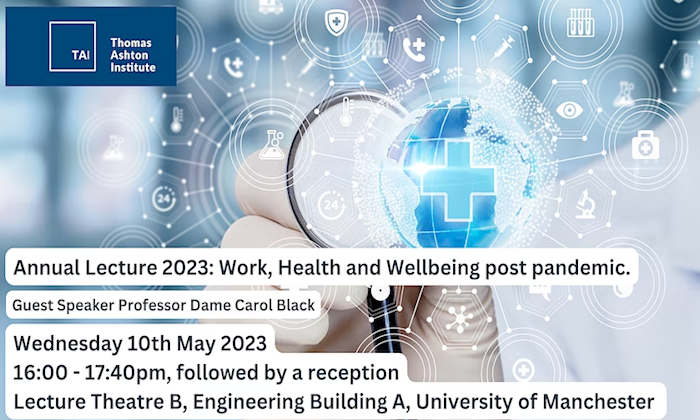Work, health and wellbeing post-pandemic: guest lecture
15 Mar 2023
Professor Dame Carol Black discusses post pandemic health - where we were, where we are now, and what the future of work might look like

The Thomas Ashton Institute Annual Lecture will take place on Wednesday, 10 May 2023 at 4pm until 5:40pm, followed by a reception.
A slow migration of industry to knowledge services, office to home, collective to individual, formal working hours to discretionary time, and work across boundaries accelerated in an unprecedented way during the COVID-19 pandemic.
These issues will be discussed in an attempt to see where we were, where we are now, and what the future of work and the workplace might look like.
Speaker Bio
Professor Dame Carol Mary Black, DBE, FRCP, FMedSci
Carol Black has built an outstanding medical career, as both clinician and scientist. She became President of the Royal College of Physicians of London in 2002 and Chair of the Academy of Medical Royal Colleges in 2006, raising the public profile of both institutions.
Around 2005 Carol became increasingly interested in the social determinants of health, and policy on welfare and healthcare. As UK National Director for Health and Work from 2006 to 2011, and latterly an Expert Adviser to government, she authored three influential independent reviews on workers’ health and wellbeing issues, pivotal to productivity and national policy. Galvanising widespread support from government, employers and others, she put across the core message that maintaining the health and wellbeing of employees throughout their working lives not only helps them and their families and the wider community, but also improves the economy, with increased productivity and reduced welfare costs.
A fourth major independent review for the UK Government, published in 2021 – on illicit drugs, their demand, supply, treatment, recovery and prevention - has led to a new 10-year anti-drug strategy, with allocation of unprecedented additional funding for addiction treatment and recovery, with remotivated workforce and collaborative working across government, hopefully leading to a safer society, with fewer homicides, reduction in serious acquisitive crime, and fewer drug-dependent people in prison.
Throughout her career, Carol has striven to obtain proper evidence – on wider social and welfare issues as well as in the medical setting – enabling government policy and action to have a firmer basis in knowledge and science, emphasising the importance of high-quality evidence and evaluation.
The lecture will take place in Lecture Theatre B, Engineering Building A.
